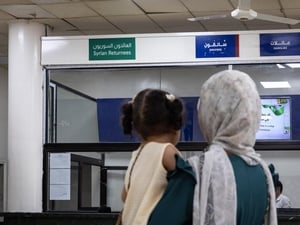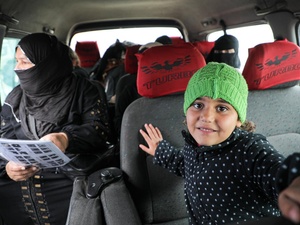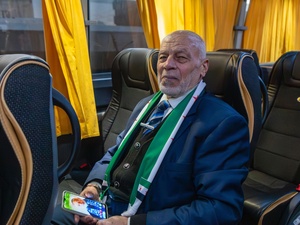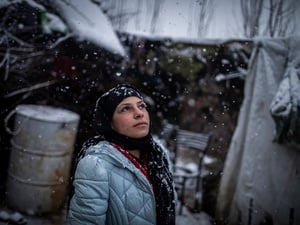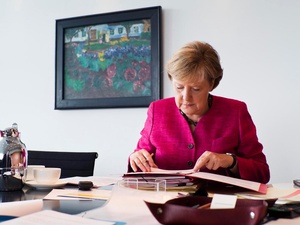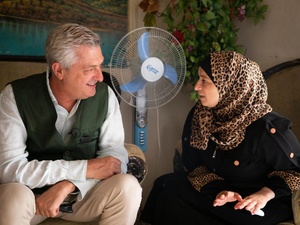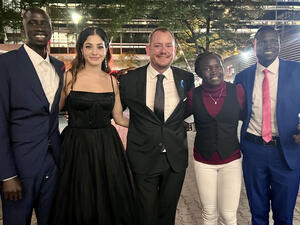Syrian actor's real-life drama has happy ending in Vienna
Syrian actor's real-life drama has happy ending in Vienna

Johnny Mhanna performing at the Schauspielhaus in Vienna in "Die Schutzbefohlenen" ("The Protégés") based on a play by Austrian Nobel Prize Laureate Elfriede Jelinek. It Is considered to be a masterpiece of contemporary drama about flight, exile and emigration. Credit: UNHCR/Mark Henley
VIENNA, Austria, March 11 (UNHCR) - Johnny Mhanna was only eight years old when his Aunt took him to the theatre in Damascus in 1999. It was the beginning of a lifelong passion for drama and acting.
"I can't forget that day", he said. "The minute I entered the theatre I smelled perfume, the same perfume that I still smell in every theatre worldwide. For me, it is the smell of freedom."
Sitting in the auditorium of the Schauspielhaus, one of Vienna's leading experimental theatres, the 24-year-old Syrian laughed: "Of course, I now smell it here too."
After a risky escape from Lebanon and an anxious time since he arrived in Vienna in August 2015, he has just learned that he has been granted asylum in Austria - a happy end to years of uncertainty.
Johnny, who grew up in a Syrian Christian family, studied drama and French literature, and dreamed of Hollywood.
His dreams and plans began to fade when the country descended into civil war in 2011. Johnny's father, a businessman, was arrested and was found dead after three days in prison. By 2012, the threat of military service loomed.
"To be on the safe side, I left three months before I was supposed to turn up at the army barracks," he said. Shortly before Christmas 2012, Johnny left Damascus and crossed the border into Lebanon.
"My grandmother on my mother's side is from Lebanon, so I could always relate to the country and its culture," he said. "But the first year was hard, even though they speak the same language, but with a different accent."
To earn enough to live, Johnny took casual jobs in cafés and bars. He soon established contacts in the local theatre and film world. He performed in commercials, stage plays, two feature films, eight short movies and two television series.
At the beginning of 2015, however, life in Beirut became impossible. The Lebanese government imposed visa restrictions on Syrian refugees, which included the requirement for a Lebanese sponsor. Those registered as refugees with UNHCR could stay only if they pledged not to work. Johnny was able to renew his status, but how could he survive without a work permit?
"I signed the paper pledging not to work in Lebanon, but if the police had caught me the fine would have been 3 million Lebanese pounds, almost 2,000 dollars. And I couldn't find a Lebanese sponsor. What to do?"
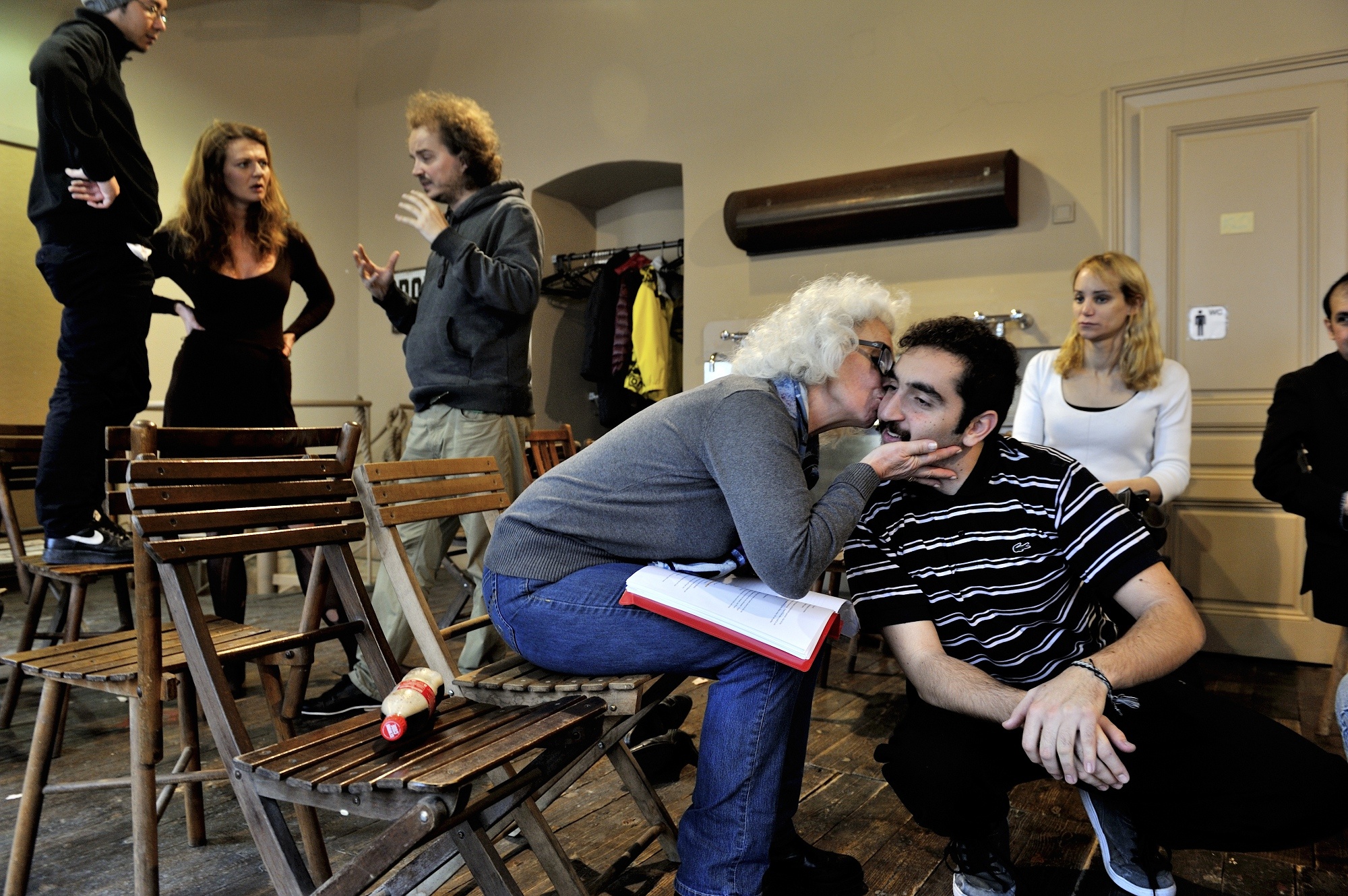
Johnny Mhanna, (with moustache) in rehearsal for the theatre play 'Outsiders' about diverse people trapped on a Metro train, with a script that evolved out of rehearsals.
In August 2015, Johnny decided to set off on the dangerous journey to Europe, hoping to reach Vienna where two of his uncles lived.
For the second time, he set out to begin a new life. "It's really hard, but once you decide to leave, you can't look back," he said. "Once you buy the ticket for the trip to Turkey, you should forget your past."
With 45 other refugees, he reached the Greek island of Lesvos after a harrowing journey of more than two-and-a-half hours across the Aegean Sea in a rubber dinghy. Once in Mytilini, the capital of Lesbos, Johnny got a message from his aunt in Vienna on WhatsApp. She passed on an ad for a Viennese theatre which said "looking for refugees with experience in theatre production".
"I said to myself, how many refugees are there with theatre experience - one, two, three, four, five? Not too many. I'll have a good chance."
Before leaving Lebanon, Johnny was sure he would have to give up acting for a few years in Austria because he did not speak German. Once he arrived at the initial reception centre, however, things turned out differently.
Within days he was chosen by the artists' collective "Die schweigende Mehrheit sagt Ja" ("The silent majority says yes") to perform in "Die Schutzbefohlenen" ("The Protégés"), based on a play by Austrian Nobel Prize winner Elfriede Jelinek. She wrote the drama after a group of refugees sought asylum in Votivkirche, a church in Vienna in November 2012.
The ensemble was made up of refugees with six professional Austrian actors. Among the refugees Johnny was the only one with experience as an actor. Only a month after he had travelled more than 2,000 kilometres from Beirut as a refugee, he was on stage for the production's September 12 premiere. It received a special prize at Austria's prestigious Nestroy theatre awards.
He is full of praise for the Austrian people. "I was very rarely treated as the stereotype refugee. What I really love here in Austria is how much people respect one another. The six Austrian actors are now very good friends, amazing people. They don't abandon you after an evening at the theatre."
While on tour with the artists' collective, Johnny decided to follow up the message his Aunt had sent him and went to an audition for "Outsiders", an experimental play in which 13 people from different backgrounds are stranded in a subway train when it breaks down. Johnny plays two parts, one a tourist who is transformed into a bug and the other a teenager from Tyrol with a heavy Austrian accent.
The director, Jakub Kavin, was impressed by Johnny's attitude: "It was a great gift for me to work with a Syrian professional actor," he said. "Right from the beginning he was totally focused and concentrated."
Johnny is looking forward to a new life in Austria. "It's beautiful to learn new languages and to meet new people," he said. "I just love the idea of working as a professional actor in three different countries."
Naturally, Johnny misses his friends and family in Damascus and Beirut, especially his mother who still lives in Damascus. He hopes the war in Syria will end sooner or later, but cannot imagine living there again. Too much has happened.
"Once the war is over, I might teach Austrian actors Arabic and send them to Syria to act," he said with a smile.
By Henriette Schroeder in Vienna


